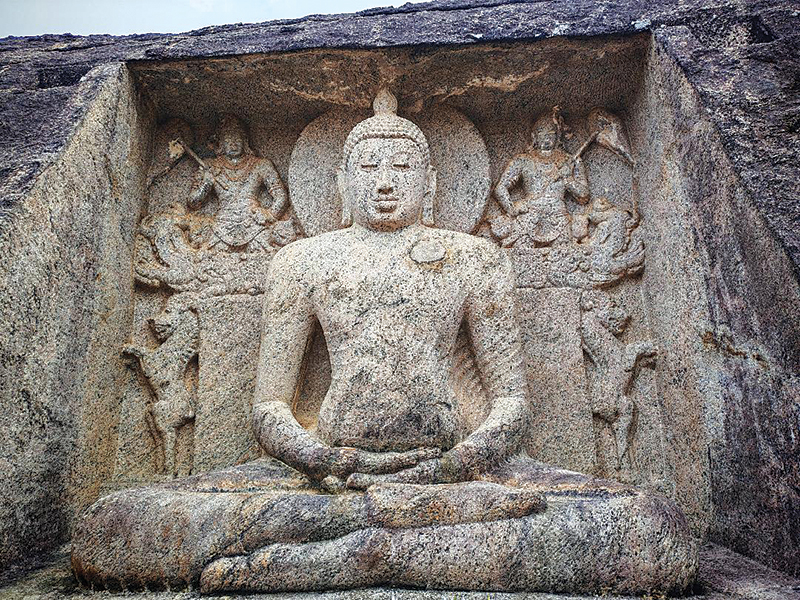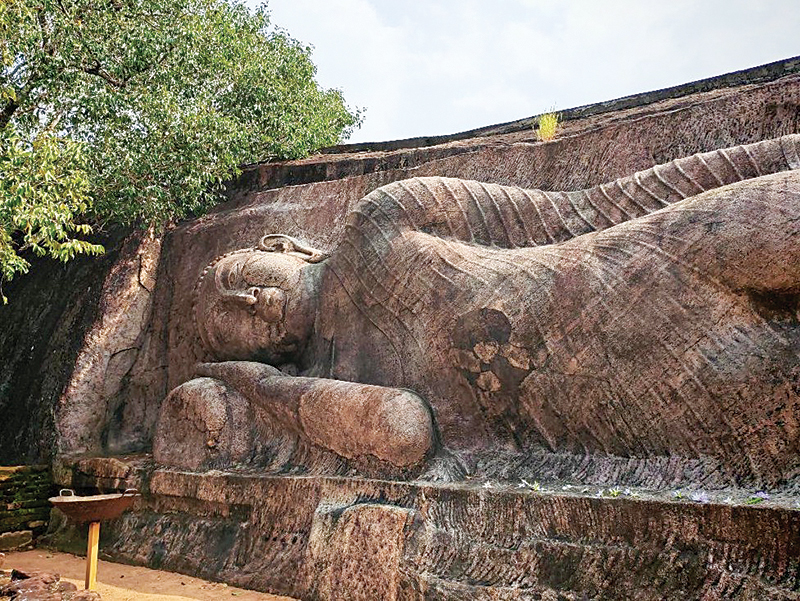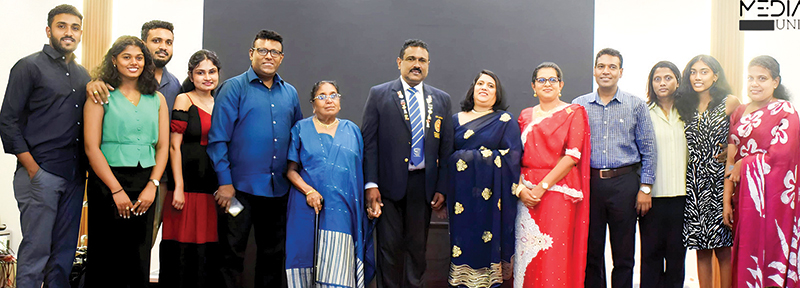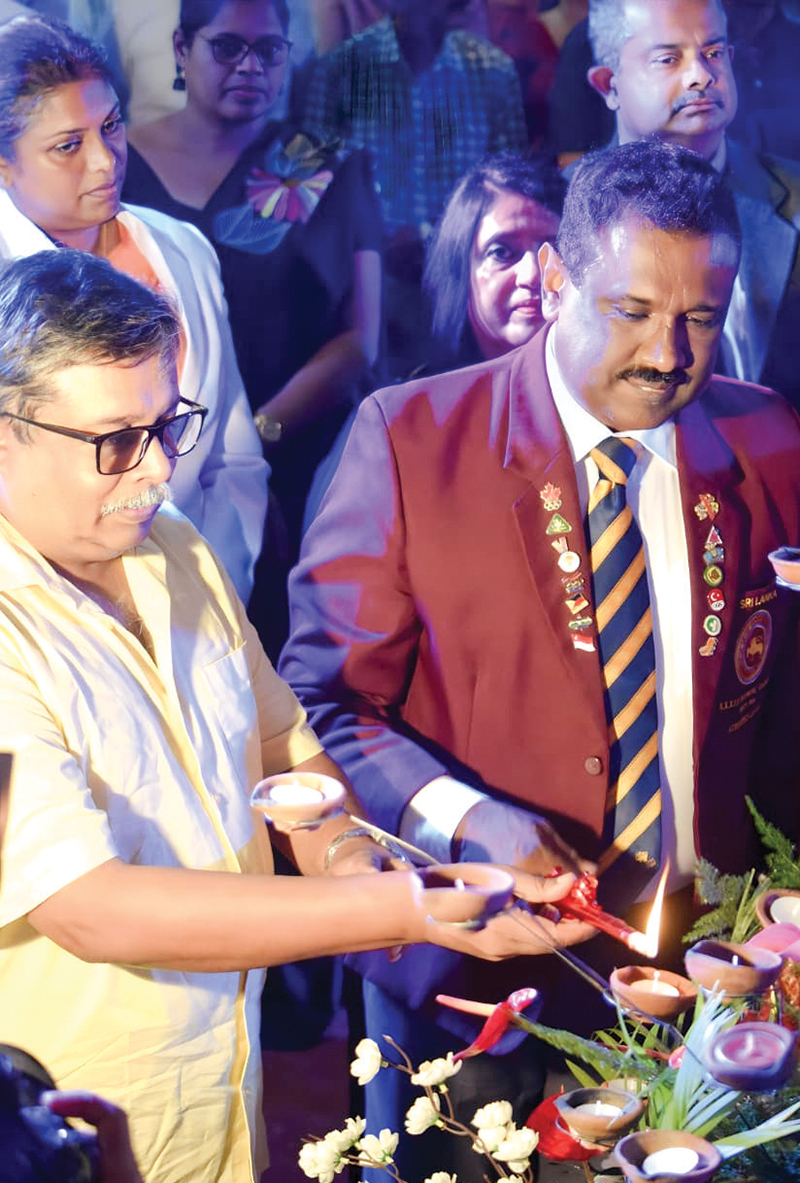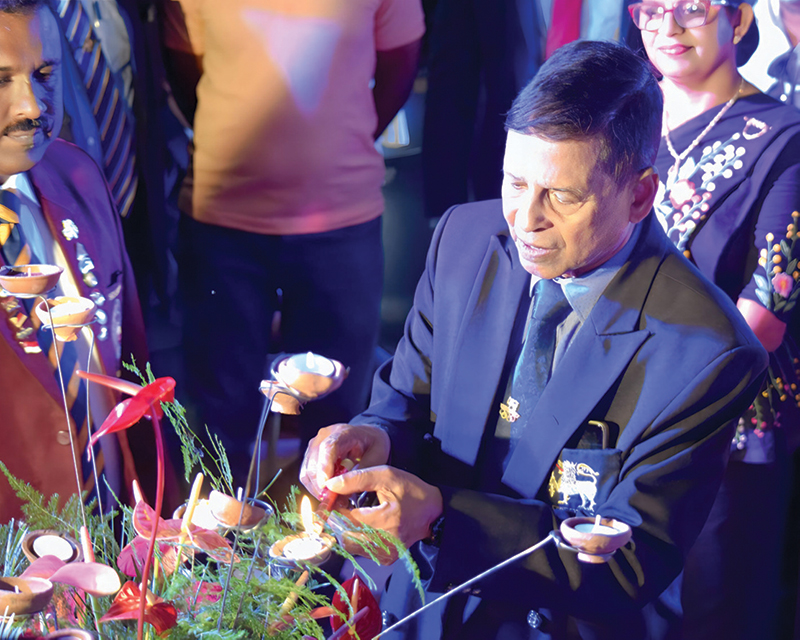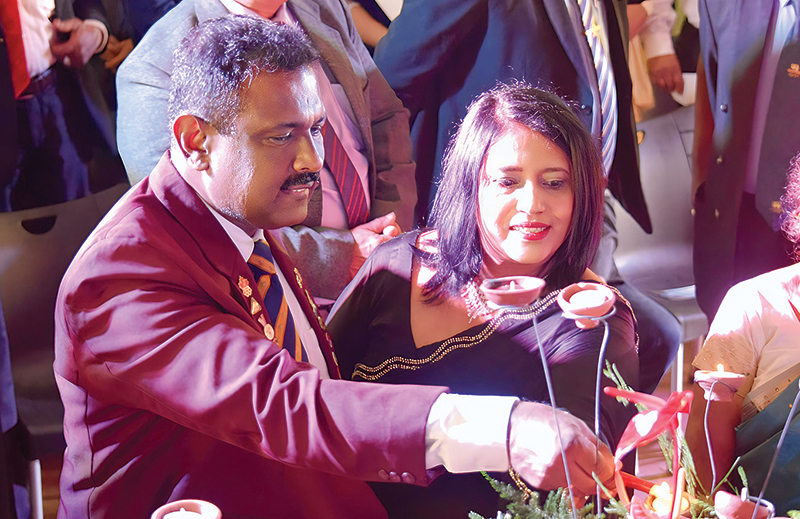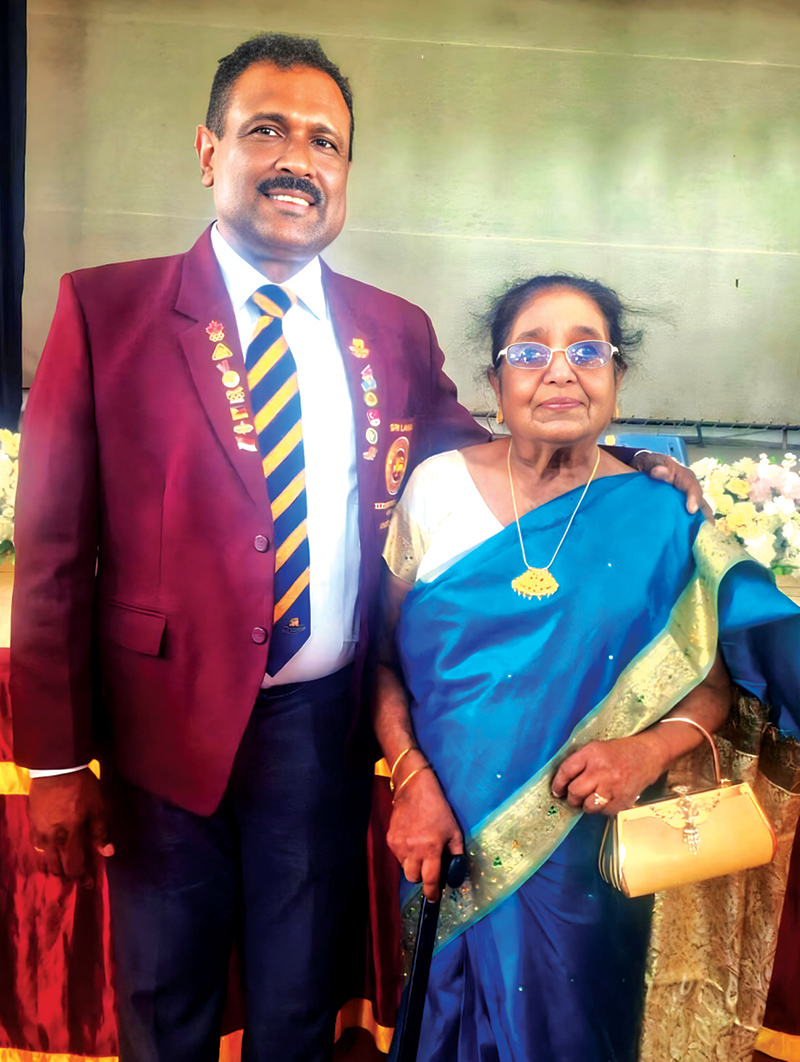Features
How much further?

How much further are we going to slide down this slippery slope O people of the Pearl? Our economy is in a shambles, our currency more worthless than it has ever been in the History of the country, we are borrowing money from Bangladesh, disease is rampant and out of control, The figures of deaths and infections released are obviously wrong, we have always had a reputation for producing terrorists and now we have unleashed one into the peaceful environs of Aotearoa – New Zealand!
A specimen (I hesitate to call it a man) who arrived in 2011, has been a confirmed “person of interest” (in the mind numbing political “correctaneese” of NZ) with ISIS connections, who could not be kept locked up in jail any longer (he has been in jail before), due to the prevailing laws has been roaming around in society. The name cannot be released according to NZ law, and he is currently known as “S” in the press. This 31-year-old has apparently been under constant surveillance (the cost of which could probably have fed and clothed a village of lower income people) and he finally concluded his “studies” (one assumes he came to university at the age of 21) with stabbing six people within the one minute (a person every 10 seconds) it took his surveillance team to get to him and shoot him like the proverbial rabid dog that he was, in the aisles of a supermarket. We have subsequently found out that his name is Ahamed Adhil Samsudeen, there seems to be some doubt if he arrived a radical or was converted in New Zealand.
There will be royal commissions appointed to inquire into the causes, the police personnel involved will have therapy, counselling, and years of recovery but the damage is done. Hopefully the law will change, and such scum will be locked away forever when detected but that is doubtful in this ultra-liberal and SO politically correct society. We Sri Lankans are now branded forever as unreliable elements of society. Sure, all these years our CVs have been rejected without interviews based on our names, only jobs such as supermarket workers, taxi drivers, mechanics and accountants running our own practice at best, have been available to the majority of us. Subsistence living with little possibility of owning boats (in the city of sails that is Auckland) and living in the “posh” suburbs have been our lot. This does lead to frustration and disillusionment and even suicide, (there is a high percentage of suicide among Lankan youth in NZ) but this is the first time we have actively been involved in mass murder or attempted mass murder.
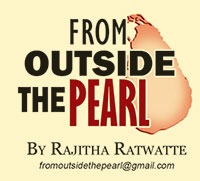 Most of us are thankful for been allowed to live in a peaceful orderly society. We can have aspirations, particularly our progeny can, to higher standards of living that should come when the subtle but effective racism in society is relaxed with the realisation that foreign doesn’t mean dangerous but we have suffered a huge setback. Some of us got calls from our workplaces (since we are working at home due to the lockdown) to find out if we had been at the location, this is customary in Aotearoa, but we wondered if the real reason was to check if we had done it! Now that is an unkind thing to think of our workmates who called with the best intentions at heart, but those thoughts do flit through your mind in these circumstances!
Most of us are thankful for been allowed to live in a peaceful orderly society. We can have aspirations, particularly our progeny can, to higher standards of living that should come when the subtle but effective racism in society is relaxed with the realisation that foreign doesn’t mean dangerous but we have suffered a huge setback. Some of us got calls from our workplaces (since we are working at home due to the lockdown) to find out if we had been at the location, this is customary in Aotearoa, but we wondered if the real reason was to check if we had done it! Now that is an unkind thing to think of our workmates who called with the best intentions at heart, but those thoughts do flit through your mind in these circumstances!
So, we go on O people of the Pearl, it seems that Kuveni’s curse will never leave us and we are doomed to dream, aspire and then have our dreams and aspirations dashed on the hard rocks of the sins of our ancestors.
Driving Elephants
One a lighter note, I saw a set of rules the other day for “driving elephants”. I nearly split my sides laughing at the image of a Policeman approaching a mahout riding an elephant with a breathalyser kit in hand to check if he is drunk while driving his elephant. The possibilities of what can ensue range from the comical to the bizarre! A rather untimely end to the test equipment, crushed underfoot by six tons of elephant to the possibility of an elephant chase with policemen either on horses or possible a police elephant corps. By the way, elephants are nervous around horses and this fact combined with a series of ridiculous inclusions in this set of rules made me wonder who had drafted them. It must be an academic who has never handled an elephant under conditions of work or even a Perahera. Or possibly an NGO lunatic with this huge unutterable LOVE for elephants based on sinister motives like killing off pereheras and such “Pegan” rituals.
No sharp pointed metal objects to be used on elephants, no night work (so no pereheras) is some of the more bizarre inclusions. A henduwa or the pointed metal object that is obviously referred to is individually built for each elephant and is made to measure. The henduwa is very rarely used as a goad, it is more a form of protection for the human should they be attacked, and the hook is used to pull the elephant away if it gets too close to another elephant or human who could be nervous of the former’s company. Elephants are animals, although I know many elephants that I prefer to certain humans I know, and they respond to their instincts, how on earth does a 80kg human keep safe in the company of a 6000kg elephant without some form of protection? Why don’t those who drafted those rules demonstrate how they can be implemented under practical circumstances for around one month and not just a few minutes.
Some of the rules like limited hours of work (although it should be specified from 7am to 11 am before the sun gets too hot) and time spent in the water (again with at least two hours with the elephants’ spine under water and lying down) and not just standing around listlessly in ankle deep water as in Pinnawela the ill-famed elephant orphanage, are good and should be implemented. Regular veterinary checks are good too. Two years maternity leave is a must but then again will only apply to elephants under the exemplary care of the vets in Pinnawela. I am not being sarcastic here, the breeding programme in Pinnawela deserves much more kudos and recognition than is given to it. Then again where in the Pearl do people who are good at a job given recognition?!! I don’t think there has been a case of domestic elephants outside Pinnawela falling pregnant (except for one blatantly fraudulent case of an owner trying to pass off an illegally captured elephant off as a calf born in captivity), for at least 20 years.
However, this is a start made in 1993 actually, with a set of rules (much more sensible than the balderdash that has just been drafted) making it to a Cabinet paper which died a natural death in the archives of what passes for a parliament in the Pearl. A start that one hopes will result in some of those elephants condemned to a life of unutterable boredom and mind-numbing lack of TLC been released to people who will treasure them and above all have the knowledge to look after them and stop another age-old tradition dying out in our already semi-destroyed society.
Features
‘Building Blocks’ of early childhood education: Some reflections
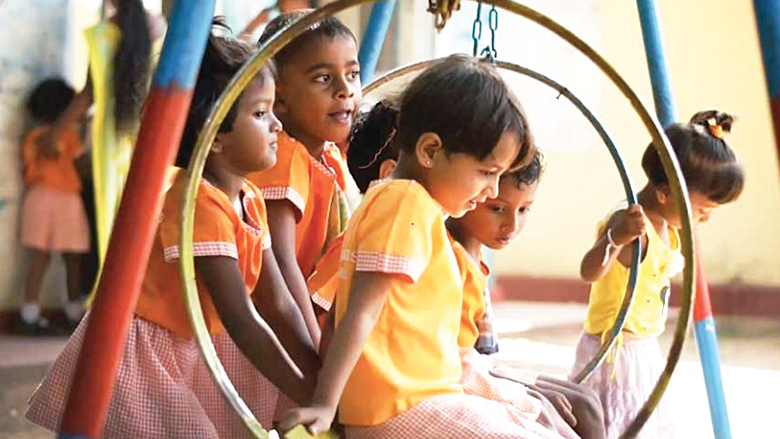
In infancy and childhood is laid the groundwork for an integrated personality in the making, in preparation for adaptation to the outside world. The malleability of the nervous system [neuroplasticity] due to its extensive growth during early childhood, considered to be the critical period for learning, offers the potential to bring about lifelong benefits in terms of social, emotional and intellectual development.
My goal in this brief article is to reflect on the essential elements [‘building blocks’] of education in early childhood which help to lay the foundation for positive outcomes in later life. It is intended to encourage conversation amongst the general readership of this important topic, especially the parents of young children, as learning begins at home.
Critical Period for learning
Early childhood usually covers the age range from infancy to about eight years of age, during which period most of the brain growth takes place. The prefrontal cortex of the brain responsible for higher cognitive functions [e. g. planning, decision making etc.] continues to mature into the mid-twenties. That isn’t to say that learning processes could not continue throughout life.
Current Community Attitudes towards Education
Let us first examine the current public attitudes towards education in general. Proficiency in reading, writing, math and science are regarded as the core academic literacies on which all other learning rests, and on which future success in life depends. The Arts and Humanities, a group of disciplines that study aspects of human society and culture, are placed lower in the hierarchy in the academic curriculum and are often considered supplementary. Their value in enhancing human ideals is often ignored. In a technologically advancing world we live in, the contribution of the study of the arts and humanities towards boosting the economy is brought into question.
The above attitude has created a highly competitive, exam driven, and hence stressful, academic environment for our children in their formative years. There are excessive demands placed upon them to achieve academically, exacerbated by parental pressure – overt or covert. Attendance at paid ‘tuition classes’, after hours, to supplement learning at school is considered essential to gain higher grades at exams, in order to be competitive in entering tertiary institutions and in enhancing career prospects. The love of learning is lost.
Many children find no time for reflection, or to read outside the curriculum to broaden their understanding about life. There is a perception in the community of a decline in literacy and sensibility in the young and their tendency to lean towards much less civilising forms of entertainment and communication, which is at the root of most of our social ills, compounded by the economic ills that currently plague us. Alarmingly, a recent survey by the College of Community Physicians of Sri Lanka has revealed that over 200 adolescents have committed suicide in 2024, which they, reportedly, attribute to their indulgence in social media. But at the heart of it is the breakdown of social order resulting in a lack of ‘meaning’ in life, as once postulated by the renowned French Sociologist, Emile Durkheim.
Family Milieu
The developing child requires the provision of certain environmental conditions, based on common principles, to complement the innate biological drive which we call instinct. Of vital importance is the family milieu, its stability and its ability to meet the child’s emotional needs. From an emotional point of view, the child needs to feel safe, and experience the contentment in the parent’s inter-relationship, in order to set the ground for learning. In addition, it helps for the parents to model the love of learning and of knowledge through communication in words and in actions.
In an ideal world, a child’s parents and teachers ought to be equally committed towards helping the child develop a love of learning. In some instances a teacher must shoulder most of the work – for instance, when parents are busy making a living or have had a limited education themselves.
Enrichment Strategies
Let us reflect on some of the enrichment strategies in early childhood education which would bring about a balance in the curriculum.
The Arts
“Engagement of children in the arts has the power to console, transform, welcome, and heal. It is what the world needs now” [Yo Yo Ma, Cellist]
The arts are commonly used as enrichment strategies in Early Childhood Education. They include music, dance, drama, and Visual and literary arts. The strengths developed through the arts during the early formative years have the potential to enhance other spheres of learning, and performance in later life. By eliciting emotions in the listener, the arts, as both Aristotle and Freud asserted, has the capacity to be therapeutic by being cathartic.
Music
Neuroscientists have shown that, due to the plasticity of the brain in young children, music training tended to enhance the auditory [hearing] pathways in the brain, and hence, the development of phonological awareness [responsiveness to contrasting sounds]. Phonological awareness is considered to be an important precursor to reading skill and the ability to rhyme. In addition, ‘Music is the language of emotions’, encouraging children to gain awareness of their own emotions in addition to making aesthetic judgements.
Drama
Research studies show that enacting stories in the classroom in comparison to dramatic performances on stage by children have several beneficial effects such as better understanding of the stories enacted and the appreciation of new stories. In addition, such classroom performances of stories enriched oral language development and reading skills, including an eagerness to read, and surprisingly, even writing skills.
Visual Arts
Engagement of children in visual art involves much more than learning the techniques of drawing and painting. Long periods of engagement in the craft provides a framework for enhancing thinking skills – to be more focussed and persistent in one’s work; to enhance the power of imagination; to generate a personal viewpoint or express a feeling state; and to encourage the child to reflect on and to make a critical judgement of their own work. Similarly, by entering into a conversation with the children after encouraging them to look closely at a piece of art, tended to heighten their observation skills. There is evidence that these habits of mind acquired from the engagement of children in visual arts could be ‘transferred’ to other areas of learning, and stand in good stead in employment in later life.
Reading
According to the British neuropsychologist, Andrew Ellis, the brain was never meant to read, in terms of human evolution: “There are no genes or biological structures specific to reading.” Reading had to be learned, requiring the integration and synchronisation of several systems of the brain acquiring a new neuronal circuitry for the purpose – perceptual, cognitive, phonemic, linguistic, emotional and motor. Reading, as it develops, aided by an environment that lures the child to read would lead to further enhancement of the cognitive capacity of the brain – an important dynamic in childhood education.
The more young children, are read to, and are engaged in conversation that flows on from stories read [‘conversational reading’], the more they begin to love books, increase their vocabulary and their knowledge of grammar, and appreciate the sounds that words generate – evidently, best predictors of later reading interest and critical thinking. Conversational reading is a technique where the parent or educator engages with the child in a conversation while reading a book, asking open-ended questions to encourage active participation and deeper comprehension, eg. entering into a dialogue about the story while reading it together.
In addition, reading enhances the child’s self-worth and personal identity [emotional experience of reading].
What better way for children to be introduced to the world that they are to be part of than to be immersed in a story that is all about beings and the environment that surrounds them? What better way for children to learn about ideas and speech patterns, how people react and interact, and how dialogue reveals more about a person than what they say, and about interpersonal relationships. Sadly, children with reading disability have a greater tendency to develop emotional and conduct disorders needing remedial support.
Children’s Literature
It is claimed that appropriate works of children’s literature, read or enacted, help the developing children build empathy and compassion – desirable human ideals that can persist through to adult life – by placing themselves in the shoes of fictional characters and simulating what the characters in the narrative are experiencing. One could argue that the same could be achieved in real life by interacting with others but does not have the advantage of having access to the inner lives of individuals as depicted in well-crafted fictional works.
There is no better way to convey moral instruction than by vicarious learning through reading. As the legendary Russian author, Leo Tolstoy, propounded in his popular monograph, ‘What Is Art?’, the value in a piece of literary art is to be judged by its ability to make the reader morally enlightened.
There is no better way for children, while gaining the aesthetic rewards of a narrative, to enhance their thinking and reasoning, generate creativity, and introduce them to a life rich in meaning.
“There are perhaps no days of our childhood we lived fully as those we spent with a favourite book…they have engraved in us so sweet a memory, so much more precious to our present judgement than what we read then with such love…”
[‘On Reading’, by Marcel Proust 1871-1922, French novelist and literary critic]
Children’s Poetry
We are endowed with a rich poetic tradition that extends as far back as the Sinhala language and its precursors. Over the centuries the lyrical content mirrored the changing socio-cultural and political landscape of our country. During the pre-independence era, there was a revival of lyrical output from men of vision aimed at enhancing the creativity and sensibility of the young, to prepare them for the challenges of a free nation, and enhance their sensibility. Foremost among this group of poets were: ‘Tibetan’ [Sikkimese] monk, Ven. S. Mahinda, Ananda Rajakaruna and Munidasa Kumaratunga. Their poems that lured the children most were about nature. Simple and well crafted, they were designed to draw children to the lap of Mother Nature, to admire her beauty and to instil in them a lasting imagery and a feeling of tranquillity. Ananda Rajakaruna’s ‘Handa’ [the moon], ‘Tharaka’ [Stars], ‘Kurullo’ [birds], ‘Ganga’ [The river]; Rev. S. Mahinda’s ‘Samanalaya’ [The Butterfly], ‘Rathriya’ [The Night]; Munidasa Kumaratunga’s ‘Morning’, which captures the breaking dawn, ‘Ha Ha Hari Hawa’ [About the Hare], are amongst the most popular. They are best recited in the original language as any attempt at translation would seriously damage their musical and lyrical qualities.
Narrative Art
Martin Wickremasinghe [1890-1976] was ahead of his time in recognising the importance of children’s literature and its positive impact on their psychosocial and intellectual development. He argued a case for establishing a tradition of children’s literature anchored in our heritage, and in keeping with the degree of maturity of the child; and that the work be presented in a simple and pleasurable form mixed with moral instruction in the right measure. He observed that a nation without children’s literature rooted in its heritage may face intellectual and moral decline. He asserted that children’s books should only be written by those who understood the developing mind.
In his publication, ‘Apey Lama Sahithyaya’ [Our Children’s Literature] Martin Wickremasinghe acknowledges past contributions to our children’s literature by prominent writers. Piyadasa Sirisena, Munidasa Kumaratunga, G. H. Perera and others transformed folk tales into prose and poetry for children. V, D, de Lanarolle was a pioneer in writing children’s stories for supplementary reading, naming his series, ‘Vinoda Katha’ [Pleasurable Stories]. Edwin Ranawaka translated children’s stories, from English to Sinhala, to suit the local readership. Martin Wickremasinghe’s own Madol Duwa, and G. B. Senanayake’s Ranarala and Surangana Katha were significant contributions to our children’s literature. Munidasa Kumaratunga took an innovative approach in producing ‘Hath Pana’ [Seven Lives], ‘Heen Seraya’ {Slow Pace], ‘Magul Kema’ [Wedding Feast] and ‘Haawage Waga’ [The Hare’s Tale] which gained immense popularity.
Despite the above, Martin Wickremasinghe argued that we have been slow in developing children’s literature of our own, although such a literary genre has been established in the west, for example, the Aesop’s Fables and the Fairy Tales of Hans Christian Anderson.
Aesop’s Fables, thought to have been narrated by a slave who lived in ancient Greece [whose identity remains obscure in history], have survived the test of time as a conveyor of values and virtues for children to reflect on, and to generate a conversation facilitated by their teacher. The allegorical tales, much admired by children [and adults!], are aimed at both entertaining and imparting moral wisdom with the use of animal characters having human attributes [Anthropomorphism] and their social interactions. The brief and lucidly told tales – 200 or more – laden with worldly wisdom, have the potential to generate a literate population, when introduced during early childhood. Let me remind you of few popular fables with their core messages: ‘The Hare and the Tortoise’ [Slow and steady wins the race]; ‘The Lion and the Mouse’ [No act of kindness, no matter how small, is ever wasted]; ‘The Cock and the Jewel’ [The value of an object lies in the eyes of the beholder]
The Fairy [fantasy] Tales of Hans Christian Andersen [1805-1875] continues to feed the imagination of growing-up children through his portrayal of unique and unforgettable characters – witches, beasts and fairies – with features of human life. The tales of the Danish master story-teller, translated into many languages, have gained universal appeal amongst children as he weaves his vastly entertaining stories such as Thumbelina, The Tin Soldier, and The Emperor’s New Clothes etc. based on fantasies with a lesson to convey. In addition to entertainment and instruction, his tales portray universal human conditions such as joy, sorrow, fear, pride, abandonment, resoluteness etc. and allow children to recognise their own feeling states, which the psychoanalysts believe is therapeutic.
The above shows that the east and west can meet on the ground of universal values, exemplified by the arts, and that human reason – the capacity of humans to think, understand and form judgement – is the true guide in life.
In sum, although reading, writing and mathematics in early childhood education are considered the core academic literacies on which other learning rests, and on which success in life depends, current research indicates that arts education through the development of certain habits of the mind could enhance academic achievement. It is thought that high arts involvement in children tend to augment their cognitive functions [eg. attention and concentration], thinking and imaginative skills, organisational skills, reflection and evaluation, which could be ‘transferred’ to other domains of the school curriculum, including science. This is in addition to the role the arts could play in enhancing interpersonal skill and emotional well-being, in conveying moral instruction, and in the exercise of empathy. As such, one could argue a case for a well-rounded system of education incorporating the arts to be introduced during early childhood.
I apologise for my ignorance in the Arts and Literature in Tamil.
Desirable Qualities of Educators
The above ideal could only be achieved through greater investment in training competent teachers in early childhood education. What ought to be the desirable qualities of an early childhood educator? It is my view that the teacher should a] have a good understanding of childhood development – physical, psychological and intellectual – and have the capacity to appreciate individual differences; b] possess ‘age-related’ conversational skills with the children – to listen and to allow free expression, with the aim of encouraging self-exploration of their work; c] have the ability to enhance children’s self-esteem while being able to set limits when necessary, within a framework of caring; d] understand the need to liaise with the parents; and, most of all, e] have a passion for educating children.
Educational Reform
Our nation is in need of a national policy on early childhood education as part of an overall plan on educational reform. It is expected that the powers that be will address a range of issues in planning of services: the inequity in access to Early Childhood Education; integration of early childhood education with the mainstream educational facilities; quality assurance and monitoring; and most importantly, greater investment in training of competent instructors in early childhood education, and creating opportunities for the teachers to be engaged in continuing education and peer review. It is hoped that the government will be able to create a framework for laying the groundwork for restructuring Early Childhood Education – a worthy cause in nation building.
Source Material
Winner, E. [2019]. How Art Works – A psychological Exploration. Oxford University Press.
Willingham, Daniel T. [2015]. Raising Kids Who Read. Jossey Bass – A Wiley Brand.
Wickremasinghe, Martin. [Second Edition 2015]. Apey Lama Sahithya [Our Children’s Literature]. Sirasa Publishers and Distributors.
Hans Christian Andersen. Andersen’s Fairy Tales. Wilco Publication 2020 Edition.
Aesop’s Fables. Wilco Publication 2020 Edition
[The writer is a retired Consultant Psychiatrist with a background of training in Adult General Psychiatry with accredited training in Child and Adolescent Psychiatry, in the UK. He is an alumnus of Thurstan College, Colombo, and the Faculty of Medicine, University of Peradeniya. Resident in Perth, Western Australia, he is a former Examiner to The Royal Australian and New Zealand College of Psychiatrists, and the recipient of the 2023 Meritorious Award of the RANZCP [WA Branch]]
by Dr. Siri Galhenage ✍️
sirigalhenage@gmail.com
Features
Where stone, memory and belief converge: Thantirimale’s long story of civilisation
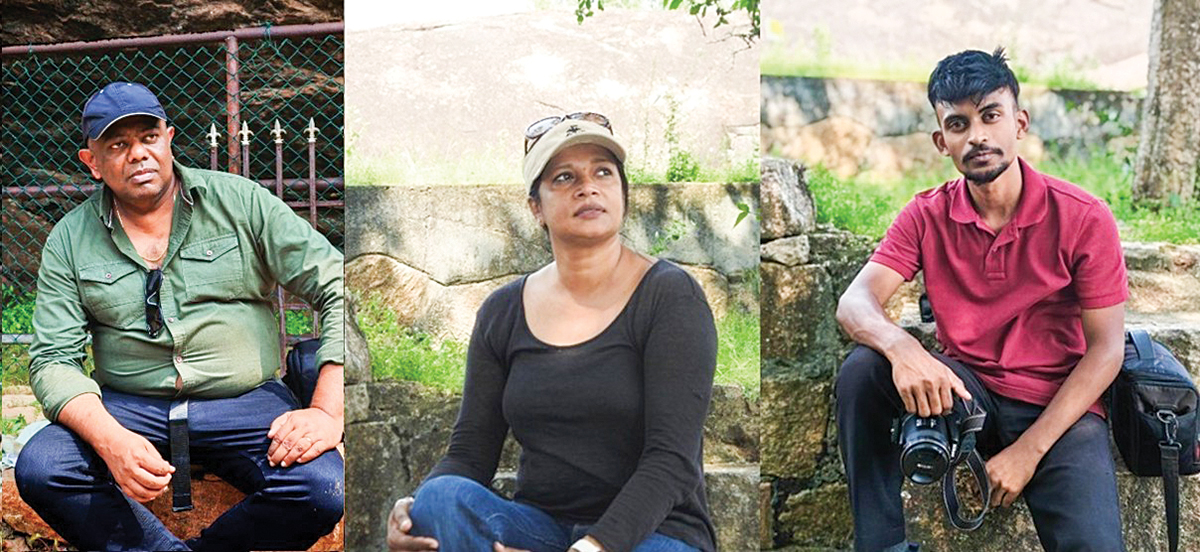
At the northern boundry of Anuradhapura, where the Malwathu Oya curves through scrubland and forest and the wilderness of Wilpattu National Park presses close, the vast rock outcrop of Tantirimale rises quietly from the earth.
Spread across nearly 200 acres within the Mahawilachchiya Divisional Secretariat Division, this ancient monastic complex is more than a place of worship. It is a layered archive of Sri Lanka’s deep past — a place where prehistoric life, early Buddhist devotion, royal legend and later artistic traditions coexist within the same stone landscape.
“Thantirimale is not a site that belongs to a single period,” says Dr. Nimal D. Rathnayake, one of the principal investigators who has been studying the area together with Ayoma Rathnayake and Eranga Sampath Bandara. “What we see here is continuity — people adapting to the same environment across thousands of years, leaving behind traces of belief, survival and creativity.”
Traditionally, the Thantirimale temple is believed to date back to the third century BC, placing it among the earliest Buddhist establishments in Sri Lanka.
The Mahavansa records that civilisation in this region developed following the arrival of Prince Vijaya, whose ministers were tasked with establishing settlements across the island. One such settlement, Upatissagama, founded by the minister Upatissa, is often identified as the ancient precursor to present-day Thantirimale.
Yet archaeology offers a deeper and more complex story. Excavations conducted in and around the rock shelters reveal that indigenous tribal communities lived at Thantirimale long before the rise of the Anuradhapura kingdom. These early inhabitants — likely ancestors of today’s Veddas — used the caves as dwellings, ritual spaces and meeting points thousands of years before organised monastic life took root.
“The rock shelters were not incidental,” Dr. Rathnayake explains. “They were deliberately chosen spaces — elevated, protected and close to water sources. This landscape offered everything prehistoric communities needed to survive.”
Over centuries, Thantirimale accumulated not only material remains, but also names and legends that reflect shifting political and cultural realities.
During the reign of King Devanampiyatissa, the area was known as Thivakkam Bamunugama, suggesting a Brahmin presence and ritual importance. Another strand of tradition links Thantirimale to Prince Saliya and Ashokamala, the royal lovers exiled for defying caste conventions.
Folklore holds that they lived in this region for a time, until King Dutugemunu eventually pardoned them and presented a golden butterfly-shaped necklace — the Tantiri Malaya — believed to have given the site its present name. Linguistic traditions further suggest an evolution from “Thangaathirumalai”, pointing to South Indian cultural influences.
Tantirimale also occupies a revered place in Buddhist memory. According to tradition, Sanghamitta Maha Theri rested here for a night while transporting the sacred sapling of the Jaya Sri Maha Bodhi from Jambukola to Anuradhapura. That brief pause transformed the rock into sacred ground, forever linking Tantirimale to one of the most powerful symbols of Sri Lankan Buddhism.
Among the most striking monuments at the site is the unfinished Samadhi Buddha statue, carved directly from a massive cube-shaped rock.
- A greater Portion of the Painted Surface of Cave NO.2
- Leatherback Sea Turtle
- The Crocodile or Land Monitor
Standing about eight feet tall, the statue bears a remarkable resemblance to the celebrated Samadhi Buddha of the Polonnaruwa Gal Viharaya. Guardian deities flank the central figure, while behind it a dragon pearl is supported by two lions — a motif associated with protection, sovereignty and cosmic balance. Dwarf figures decorate the seat, adding layers of symbolic meaning and artistic refinement.
“What is extraordinary here is the ambition of the sculpture,” says Dr. Rathnayake. “This was clearly intended to be a monumental work.” Excavations around the statue have uncovered stone pillars and evidence of a protective roof, indicating that artisans worked under shelter as they shaped the figure.
The statue’s incomplete state is most plausibly explained by the foreign invasions and political instability that marked the later Anuradhapura period. Stylistic features suggest that the work continued into, or was influenced by, the Polonnaruwa period, underscoring Thantirimale’s enduring importance long after Anuradhapura’s decline.
Nearby lies another monumental expression of devotion — the reclining Buddha statue, measuring approximately 45 feet in length. Unlike the Samadhi statue, this figure has been detached from the living rock and is dated to the late Anuradhapura period. Its scale and proportions closely resemble Polonnaruwa sculpture, reinforcing the idea of a continuous artistic and religious tradition that transcended shifting capitals and dynasties.
Yet the most ancient and fragile heritage of Thantirimale is found not in its monumental statues, but in two adjacent caves within the monastic complex. Their walls still bear the fading traces of prehistoric rock paintings dating back nearly 4,000 years. First recorded by John Still in 1909, these paintings were later documented and analysed by scholars such as Somadeva.
The paintings include human figures, animals, geometric patterns and symbolic motifs, suggesting ritual practices, storytelling and shared cultural memory. “If Tantirimale functioned as a common meeting place for independent territorial groups,” Dr. Rathnayake observes, “then these images may represent a shared visual narrative — a way of communicating identity and belief beyond spoken language.”
One of the caves, previously known to contain both human and animal figures, has deteriorated significantly and now requires urgent conservation intervention. The second cave, however, offers a rare and intriguing glimpse into prehistoric ecological awareness.
Among the animal figures are two images believed to represent a Leatherback Sea Turtle and either a crocodile or land monitor, measuring 18 and 13 centimetres respectively. The turtle depiction is particularly striking for its anatomical accuracy — the ridges on the carapace are clearly visible, aligning closely with known herpetological characteristics.
“These details suggest close observation of nature,” says Dr. Rathnayake. Archaeological evidence supports this interpretation. According to earlier studies, sea turtles were transported to Anuradhapura as early as 800 BC. During the Gedige excavations in 1985, bones of the Olive Ridley sea turtle were discovered, possibly used for ornaments or utilitarian objects. Images of land monitors and crocodiles are common in dry-zone rock art, reflecting both ecological familiarity and subsistence practices, as Veddas are known to have consumed the flesh of land monitors.
Today, Thantirimale stands at a critical crossroads. Encroaching vegetation, weathering stone, fading pigments and increasing human pressure threaten a site that encapsulates millennia of human adaptation, belief and artistic expression. For Dr. Rathnayake and his team, the need for protection is urgent.
“Thantirimale is not just an archaeological site or a temple,” he says. “It is a living record of how humans have interacted with this landscape over thousands of years. Preserving it is not simply about protecting ruins — it is about safeguarding the long memory of this island.”
In the quiet of the rock shelters, where prehistoric hands once painted turtles, hunters and symbols of meaning, Thantirimale continues to whisper its story — a story written not in ink or inscription, but in stone, pigment and belief.
By Ifham Nizam ✍️
Features
Coaching legend Susantha calls time on storied career

Veteran athletic coach Susantha Fernando called time on his illustrious career in the state service recently. Fernando, who began his career as a physical education teacher was the Assistant Director of Education (Sports and Physical Education- Central Province Sports Schools) at the time of his retirement last month.
Susantha was responsible for transforming the then little known A. Ratnayake Central, Walala, into an athletics powerhouse in the schools sports arena. His sheer commitment in nurturing the young athletes at Walala not only resulted in the sports school winning accolades at national level but also produced champions for Sri Lanka in the international arena.
These pictures are from the event to launch his autobiography Dekumkalu Kalunika and the felicitation ceremony organised by Tharanga Gunaratne, Director of Education at Wattegama Zone to felicitate him following his retirement.
Former Walala athletes, his fellow officials and a distinguished gathering including former Director of Education Sunil Jayaweera were gathered at the venue to felicitate him.
- Susantha Fernando with his family members
- Susantha with his wife, Ranjani, sons, Shane and Shamal and daughter Nethmi
- Tharanga Gunaratne, Director of Education at Wattegama Zone addressing the gathering
- Sisira Yapa, who delivered the keynote address at the book launch
- Former Director of Sports of the Ministry of Education Sunil Jayaweera
- Susantha’s first international medallist marathoner D.A. Inoka
- A dance item in progress
- Susantha Fernando with his wife Ranjani
- Susantha with his mother
-

 Editorial7 days ago
Editorial7 days agoIllusory rule of law
-

 Features7 days ago
Features7 days agoDaydreams on a winter’s day
-

 Features7 days ago
Features7 days agoSurprise move of both the Minister and myself from Agriculture to Education
-

 Features6 days ago
Features6 days agoExtended mind thesis:A Buddhist perspective
-

 Features7 days ago
Features7 days agoThe Story of Furniture in Sri Lanka
-
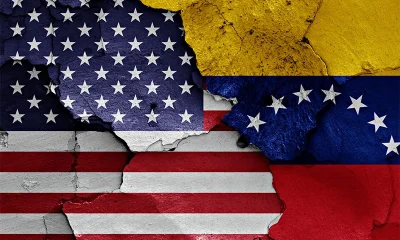
 Opinion5 days ago
Opinion5 days agoAmerican rulers’ hatred for Venezuela and its leaders
-
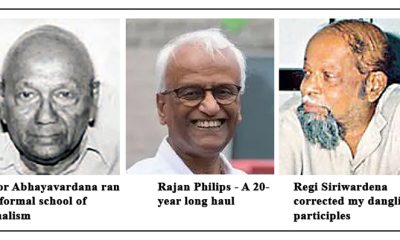
 Features7 days ago
Features7 days agoWriting a Sunday Column for the Island in the Sun
-

 Business3 days ago
Business3 days agoCORALL Conservation Trust Fund – a historic first for SL


